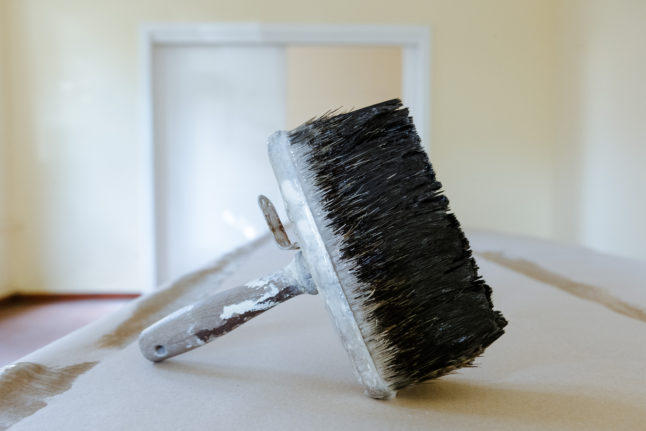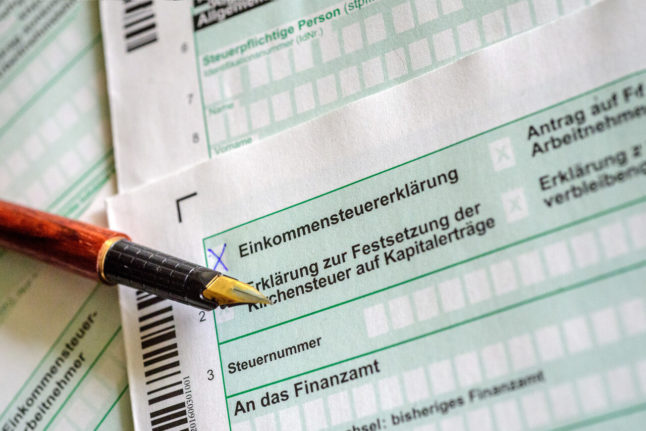The rules around renting in Germany can be incredibly confusing for foreigners, with conflicting advice around making noise, having pets or leaving the flat in a certain condition when you move out.
One thing that’s commonly heard is that tenants should repaint the entire apartment when they move elsewhere – or even pay to have it done by professionals. But is that actually true?
In reality, the rules around whether you have to renovate the flat are slightly more complex than they first appear. Here’s what you need to know.
What if the flat was unrenovated when I moved in?
A good rule of thumb when moving out of a rental property is to leave it in the condition you found it. As it turns out, this is also relevant to the wall-painting rule.
Tenants who take over their flat unrenovated when they move in do not have to renovate it when they move out – even if the tenancy agreement stipulates that they’re responsible for “cosmetic repairs”.
In 2015, the Federal Supreme Court (BGH) issued a number of landmark decisions on flat renovations. According to these rulings, landlords aren’t allowed to ask tenants to renovate the flat or pay part of the renovation costs if the flat was not renovated when the tenant moved in.
According to the court, forcing renters to undertake this type of renovation work would put them at an unreasonable disadvantage.
READ ALSO: How much deposit do I have to pay when renting in Germany?
I’ve only been here a short time. Do I still have to repaint?
Generally not, though it may still make sense to do a small touch-up if there are obvious stains on the wall.
According to the Supreme Court, tenants who move out before any so-called “cosmetic repairs” are due shouldn’t have to pay anything towards the renovation costs, regardless of whether the flat was newly renovated when they moved in or not.
Previously, some landlords had asked for a proportion of the costs of repainting the property that was linked to the amount of time people had spent in the flat. So, if renovations were deemed to be due after eight years and the tenant moved out in four, they might have asked for 50 percent of the renovation costs.
However, the court in Karlsruhe decided that this type of clause placed an unfair burden on the tenant, partly because it was based on a painter’s estimates and not the actual condition of the property.
The decision means that many clauses stipulating that the tenant should contribute a certain amount to renovations costs per year are actually invalid.
What counts as a “cosmetic repair”?
Schönheitsreparaturen, or “cosmetic repairs” in English, is a word that’s bandied around a lot to describe the simple renovations that are usually done to a flat between tenants.
In other words, they’re not repairs at all, but rather small, simple touch-ups designed to remove any signs of everyday wear and tear from the previous tenant.
This includes:
- Painting and wallpapering ceilings, walls, doors and radiators
- Fixing any holes in the wall from pictures or coat racks
- Touching up the insides of window and door frames
It doesn’t include intensive renovation work like stripping the floorboards and it also doesn’t include taking care of the outside of the property, as this obviously isn’t affected by somebody living inside the building.
READ ALSO: EXPLAINED: The hidden costs of renting in Germany
Do walls have to be painted white?
Not necessarily, though white does tend to be a fairly safe bet. The rule here is to avoid any bright or garish colours: stick to neutral tones that are seen to be appealing to the vast majority of people.
So if you’ve personalised your flat with some striking colours, you will have to repaint the walls before moving out.

How often do renovations have to be done?
This is a tricky question to answer as it obviously depends in part on how careful and conscientious the tenants are.
The Federal Court of Justice has confirmed in several decisions that rigid deadlines for cosmetic repairs are not permissible, which means clauses that prescribe a clear date for repairs such as “every three years” or “after 4 years at the latest” are invalid.
“In new tenancy agreements it must therefore be made clear that the tenant does not have to renovate just because the deadline has passed, but because the flat needs it,” says tenancy law specialist Thomas Hannemann. Landlords are entitled to put more variable deadlines in the contract that can be brought forward or extended depending on actual wear and tear, but even these “softer” deadlines shouldn’t be too short.
Lawyer Thomas Hannemann recommends that landlords use the following periods as a guide in the contract:
- Five years for bathrooms and kitchen
- Eight years for living rooms, bedrooms, hallways and toilets
- Ten years for adjoining rooms
READ ALSO: Six confusing things about renting a flat in Germany
What should I do when I move out?
Firstly, check your contract to see what kind of cosmetic repairs are expected on the move-out date – but be alert for any invalid clauses like the ones discussed above.
Once again, if the flat wasn’t newly renovated when you moved in, you shouldn’t be expected to pick up a paintbrush at all. You also shouldn’t be liable for costs if you move out before any renovations were due.
To avoid stress, it’s a good idea to get a handle on expectations well ahead of time. This can be done by discussing any invalid contract clauses with your landlord and trying to come to an agreement that suits both of you.
Hannemann recommends having these discussions around two or three months before the contract expires and recording the outcome of the conversations in writing.
Once again, leaving the flat in the condition you found it is a safe rule of thumb, so don’t feel you have to shell out loads for a full painting service in a flat you’ve only been in for two or three years.



 Please whitelist us to continue reading.
Please whitelist us to continue reading.
Member comments